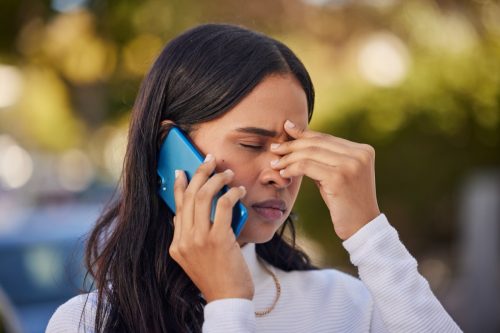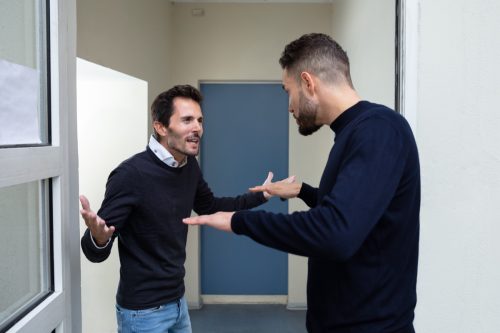Chances are you’ve been through some sort of breakup, which can be emotionally taxing regardless of which side you’re on. However, significant others aren’t the only people who come and go in life; we also sometimes lose friends. It could be that you simply drift apart, but in other instances, dissolving friendships are a bit messier. In fact, experts warn that a friend breakup can be equally, if not more, upsetting than a romantic one.
“Research has shown that friend breakups can be just as difficult to get over as a romantic relationship,” Beth Ribarsky, PhD, professor and director of the School of Communication at the University of Illinois Springfield, tells Best Life. “For many individuals, they may have more time and energy sunk into a long-term friendship than some romantic relationships. Therefore, the ending of a friendship, whether initiated by yourself or the other, can be quite hurtful.”
If you feel like you’re not as close with a friend and wondering why, therapists say you need to consider their recent behavior, as well as your own. Read on for 11 signs a friendship is fizzling out.
RELATED: What Is Friendship Burnout, and How Can You Overcome It?

Friends are the people we talk to to help relieve stress, as they allow us to be our authentic selves. But if you find that you’re anxious or worried when a friend calls or when you see each other, it’s not something to ignore.
“Although we all have times when there are commitments we’d like to find a way out of, we ultimately should feel happy or excited when we get a text or call from our friend and should look forward to the time we get to spend with them,” Ribarsky says. “However, if you’re finding yourself hitting the ignore button or finding excuses to not get together, it’s a good sign the relationship is no longer benefitting you.”
You might not be alone in this feeling, either. When a friend consistently cancels plans, they could have similar feelings about your connection.

No one’s perfect, and sometimes we do make mistakes that result in broken trust. But if a friend is gossiping about you or sharing private details that you asked them to keep to themselves, it might be a sign that a breakup is imminent.
“Whether it is disclosing information you thought was private between the two of you or not showing up when they said they would, trust can sometimes be irreparably broken,” Ribarsky cautions.
RELATED: 7 Warnings Signs That You Have a Toxic Friendship.

All relationships are a two-way street, and there’s typically an equitable division between who hosts for a wine night or whose turn it is to carpool. But when friendships are disintegrating, you’ll probably feel like more responsibility is on your shoulders.
“If you’re the one who is always initiating the texts or making plans, it might begin to feel like a very one-sided relationship,” Ribarsky says.
However, in this case, don’t forget about the normal, natural ebbs and flows of relationships.
“There are times where you may find you’re putting more into a relationship than your friend or vice versa,” Ribarsky explains. “Ultimately, it is about the big picture—knowing your investment in the friendship is still benefitting you.”

It’s not uncommon to feel self-conscious or down on occasion. We all have stress, whether it’s from work, family, or other areas of life. But if you find that this melancholia is constantly occurring when you’re around a specific friend, consider how the relationship is affecting you.
“Sometimes friendships can turn toxic. They may say disparaging things about you, but when confronted, they will say, ‘I was just joking.’ Or, they may find ways to one-up you,” Ribarsky says.
For example, you might share a work accomplishment, and a friend will then “divert the attention back to them, a great accomplishment they’ve had, or belittle your event,” she adds.
As a result, you may feel zapped of energy after hanging out with this friend or acquaintance.
“Spending time with a close friend should be refreshing and energizing,” says Courtney Hubscher, MS, LMHC, NCC, of GroundWork Cognitive Behavioral Therapy. “Feeling emotionally drained after seeing someone is a warning sign that things may not be as they once were.”
RELATED: How to Apologize to a Friend, According to Relationship Experts.

This sign is more subtle, but if you feel like your conversations lack depth or feel superficial, your friendship could be dissolving.
“This is a sign that they may be pulling away from you,” Daniel Rinaldi, therapist and founder of Mind Noise Coaching, tells Best Life. “Another similar sign is noticing that you and your friend no longer share common interests or even respect each other’s interests and want to know more about them.”

Close friends are some of our biggest supporters in life, meaning we want to share big news when it comes our way. So, if you’re not inclined to reach out about your new promotion, or you didn’t get a text about their recent engagement—when you usually would—it’s a sign something is amiss.
“When you or your friend no longer share important life events with each other, it shows that the friendship isn’t a priority for either of you,” Matthew Schubert, mental health counselor and operator of Gem State Wellness, tells Best Life. “These can be events like your birthday, a child’s birthday, losses of loved ones, new jobs, changes in housing, and other events that you would normally look for support or encouragement from a close friend.”
RELATED: 10 Red Flags Your Friend Is a Narcissist, Therapists Say.

It’s important for friends to build each other up, but there are also times when constructive criticism is warranted. However, nitpicking and constant putdowns are a different story—and friends who do this often may be trying to send you a message.
“Sometimes someone who lacks the emotional maturity to end a friendship will hope that if they criticize you enough or generally make you feel miserable, that you will be willing to be the ‘bad guy’ and end the relationship,” Ribarsky says.

Another great part about having a friend is the ability to reach out and chat whenever. But when you’re on the verge of a breakup, talking to them (whether it be on the phone, via text, or in person) may feel like it isn’t as easy as it once was.
“If you sense that your conversations lack the natural flow and connection that once characterized your friendship, it’s a sign that something might be amiss,” Schubert says.
RELATED: 13 Deep Questions to Ask Your Close Friends.

Clinical psychologist Carla Marie Manly, PhD, author of Joy from Fear, also points to deteriorating communication as a sign of trouble.
“In strong friendships, the key sign that the relationship may be ending involves toxic, defensive behaviors such as stonewalling,” she says. “If a once-true friend is no longer willing to communicate—to really work through issues that arise—the relationship really can’t move forward.”
If your friendship is more surface-level, a friend may even “ghost” you and stop answering your texts or calls.

It might take a little more time to notice, but changing interests and values could also mean you’re headed for a friend breakup.
“One of the most critical signs of an impending friendship breakup is one person’s realization that they are not aligned on core levels such as values and interests,” Manly says. “When deal-breaking epiphanies arise—those ‘aha’ moments that illuminate critical differences—the ending of the friendship is often not too far behind.”

You don’t have to have the exact same opinions to be friends with someone, but it can spell trouble if you’re regularly disagreeing or arguing.
“Constant disagreements can serve as a key indicator that a friendship may be approaching its end,” she says. “If you and your friend are continually at odds, struggling to find common ground, or frequently engaging in heated debates, it could be a sign of deeper, unresolved issues within the relationship.”

According to Manly, while certain signs spell trouble, friendships that are “grounded by heartfelt connection and mutual TLC” can withstand some bumps in the road.
“Depending on the nature of the friendship—whether it’s strongly rooted or fairly shallow—the signs of an impending breakup can manifest differently,” she says. “What signals the ultimate demise of a shallower friendship may be felt as a temporary shift in a stronger relationship.”
So, before you jump to too many conclusions, you may want to take a closer look at your relationship when trying to understand a friend’s behavior.
“Having weathered life’s challenges, disruptions, and changes, strong friendships tend to last unless a toxic behavior or negative pattern arises,” Manly notes. “Friendships that have less of a genuine connection—those that are more based on convenience or superficial interests—often rupture or fade away more easily.”
